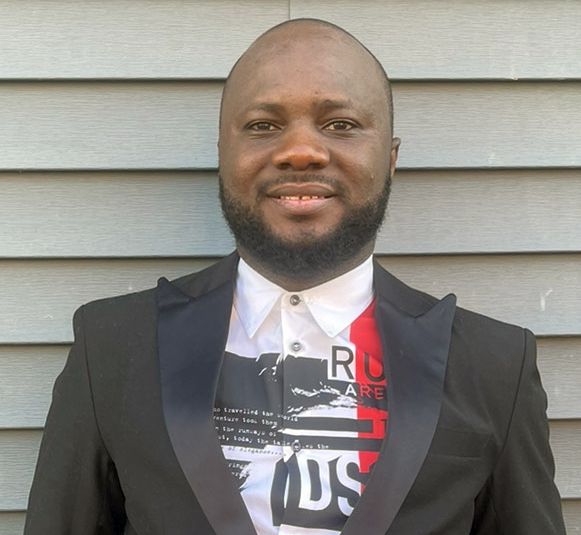There has been a lot of attention on the influx of asylum seekers coming to Maine — especially the strain on state resources.
The picture is admittedly complicated. Maine’s 2022 fiscal year budget ended in the black, though a shortage of affordable housing persists. But if we want to have an honest conversation about asylum seekers in our state, we can’t just argue about numbers. We should be asking: Who are these asylees as human beings? What kind of lives do they build here in Maine?
Last spring, Mark Dion, a Portland city councilor and a member of the city’s Health and Human Services and Public Safety Committee, noted asylees “are going to be an incredible human resource to our communities moving forward and they’re going to add desperately needed labor to the market.”
As a former asylum seeker who knows the community well, I can attest to the truth of this statement. As individuals, we prioritize self-sufficiency. As a group, we give each other support to make that financial independence possible.
It’s worth understanding what happens when asylum seekers arrive in Maine. Those without local ties start at a shelter, where they are connected with nonprofits that help them start the legal process of pursuing their asylum claim and sign them up for initial food and housing assistance. This support is crucial.
Legally, asylum seekers can’t even apply for work permit until 150 days after their asylum request has been filed. Even then, it typically takes a year after arrival before a work permit is approved. In the community, this is widely a point of frustration; people are eager to work. They don’t want to wait.
Luckily, though, a longer-term support pipeline soon activates. Here in Maine, the vast majority of asylum seekers are from Africa and Haiti. These immigrant community networks thrive on trust and empathy; we become critical resources for each other — helping newcomers get around, secure permanent housing, enroll kids in school, get to the doctor and, eventually, find jobs. In short, asylum seekers go out of their way to help each other integrate.
Take Samu Tona, who came to Maine from Angola in 2017 after fleeing rising crime rates and persecution. I met him at the Immigrant Resource Center of Maine, where I worked as a volunteer supervisor. I gave him a map of Lewiston, pointed out landmarks like city hall and showed him where to go to learn more about housing and work opportunities. We exchanged numbers and became friends.
After a year, he got his work permit and was hired at Tyson Foods. Within months, he was promoted to a production supervisor role. I recruited him to volunteer at the public health coalition where I work, and he proved invaluable by using his multilingual skills to help patients fill out forms in the six languages he knows. Samu and I also joined the same community soccer league. I’ve befriended his family. He lent me his car when my own was having trouble. We represent a piece of home to each other. Beyond that, our relationship encourages each of us to keep building a new, meaningful life here.
Another example is Graça Muzel, whom I met at Church of All Nations. He came here from Angola after his father fled political persecution for his work as an activist. I guided Graca and his father through the health care system, helped them make doctor appointments and apply for insurance.
Then, during Covid, when I needed volunteers to provide culturally and linguistically appropriate messaging around vaccines, Graca stepped in. He did so even though he was busy finishing high school and starting college. Now, he’s been named Washington County Community College Student of the Year and has another year left there before he plans to transfer to the electrical engineering program at the University of Maine.
These are just two of countless examples. I’m proud to say nearly every asylum seeker I’ve met, once their initial needs are met, find ways to give back to the community. Like Maide Tahar, who came here from Chad was introduced to me through his cousin, and now runs his own home health business taking care of Maine elders.
We help collect donations for those in need. We volunteer as translators at schools. We’ve established a French Club where English and French speakers can come together to exchange language and culture. We feel grateful to have been given a hand up. And in return, we turn around and offer our hand to those who’ve arrived after us.
With the midterms and governor’s race coming up next month, the debate around whether new Mainers contribute more to their communities than whatever initial help they receive will continue to be a hot topic. To anyone worried there’s not enough resources to go around, think of it like this: Yes, these new arrivals do require Mainers to make a small investment. But the returns make this whole community stronger and better for a prosperous future.
Héritier Nosso is a health promotion coordinator and community organizer in Lewiston.
Send questions/comments to the editors.



Success. Please wait for the page to reload. If the page does not reload within 5 seconds, please refresh the page.
Enter your email and password to access comments.
Hi, to comment on stories you must . This profile is in addition to your subscription and website login.
Already have a commenting profile? .
Invalid username/password.
Please check your email to confirm and complete your registration.
Only subscribers are eligible to post comments. Please subscribe or login first for digital access. Here’s why.
Use the form below to reset your password. When you've submitted your account email, we will send an email with a reset code.